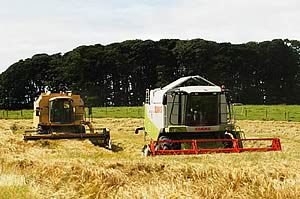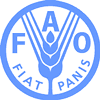 |
|||||||||
|
|||||||||||||||||||
|
|
Soaring
Cereal Bill Impacts on Poorest Countries The cereal import bill of the world’s poorest countries is forecast to rise by 56 percent in 2007/2008. This comes after a significant increase of 37 percent in 2006/2007, FAO said today.
For low-income food-deficit countries in Africa, the cereal bill is projected to increase by 74 percent, according to the UN agency’s latest Crop Prospects and Food Situation report. The increase is due to the sharp rise in international cereal prices, freight rates and oil prices. International cereal prices have continued to rise sharply over the past two months, reflecting steady demand and depleted world reserves, the report said. Prices of rice increased the most following the imposition of new export restrictions by major exporting countries. By the end of March prices of wheat and rice were about double their levels of a year earlier, while those of maize were more than one-third higher, according to the report. FAO has launched an Initiative on Soaring Food Prices (ISFP), offering technical and policy assistance to poor countries affected by high food prices in order to assist vulnerable farmers to increase local food production. Field activities are starting in Burkina Faso, Mauritania, Mozambique and Senegal. FAO will also help governments prepare actions and strategies to increase agricultural production. In collaboration with the World Food Programme, IFAD and other partners, FAO will establish a food market information unit to pull together and analyze various data sources at local, national and international levels and to disseminate this information. FAO has allocated US$17 million for these activities. Domestic food prices spur social unrest Prices of bread, rice, maize products, milk, oil, soybeans and others basic foods have increased sharply in recent months in a number of developing countries, despite policy measures -- including export restrictions, subsidies, tariff reductions and price controls -- taken by governments of both cereal importing and exporting countries to limit the impact of international prices on domestic food markets. Food riots have been reported in Egypt, Cameroon, Cote d’Ivoire, Senegal, Burkina Faso, Ethiopia, Indonesia, Madagascar, the Philippines and Haiti in the past month. In Pakistan and Thailand, army troops have been deployed to avoid seizing of food from the fields and from warehouses. “Food price inflation hits the poor hardest, as the share of food in their total expenditures is much higher than that of wealthier populations,” said Henri Josserand of FAO’s Global Information and Early Warning system. “Food represents about 10-20 percent of consumer spending in industrialized nations, but as much as 60-80 percent in developing countries, many of which are net-food-importers.” 2008 forecast: production up According to FAO’s first forecast world cereal production in 2008 is to increase by 2.6 percent to a record 2 164 million tonnes. The bulk of the increase is expected in wheat, following significant expansion in plantings in major producing countries. “Should the expected growth in 2008 production materialize, the current tight global cereal supply situation could ease in the new 2008/09 season,” the report said. But much will depend on the weather, FAO cautioned, recalling that at this time last year prospects for cereal production in 2007 were far better than the eventual outcome. Unfavourable climatic conditions devastated crops in Australia and reduced harvests in many other countries, particularly in Europe. “Favourable climatic conditions will be even more critical in the new season because world cereal reserves are depleted,” the report said. According to FAO’s forecast, world cereal stocks are expected to fall to a 25-year-low of 405 million tonnes in 2007/08, down 21 million tonnes, or 5 percent, from their already reduced level of the previous year. “Any major shortfalls resulting from unfavourable weather, particularly in exporting countries, would prolong the current tight market situation; contribute to more price rallies and exacerbate the economic hardship already facing many countries,” the report said. FAO urges all donors and International Financing Institutions to increase their assistance or consider reprogramming part of their ongoing aid in countries negatively affected by high food prices. A tentative estimation of the additional funding required by the governments to implement country projects and programmes for dealing with soaring food prices ranges between US$ 1,2 and 1,7 billion. The release of these funds can provide important support for poor farmers, including access to inputs and assets, to enhance the food supply response in the next agricultural seasons. Worldwide, 37 countries are currently facing food crises, according to the report. Click here for the complete list of countries in need of external assistance.
|
||||||||||||||||||

|
|
||||||||||||||||||
| home | agri-services | pedigree
pen | news | dairy | beef | machinery property | organisations | site map |
|||||||||||||||||||


